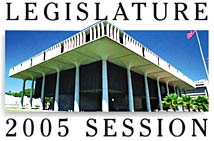Rail transit
gets new pulse
Bills give counties the power
to raise excise taxes to pay
for transportation
Bills that would give the city the ability to raise taxes to fund rail transit are moving forward in the state Legislature.
Senate and House committees passed measures yesterday that would give all four counties the option to raise the 4 percent excise tax by up to 1 percent. The "surcharge" would fund the construction and operation of transportation projects, including a rail system.
|
|
The House Transportation Committee passed House Bill 1309 with a 10-year maximum period of collection.
The Senate Transportation and Intergovernmental committees passed companion Senate Bill 1731 without a deadline but also approved Senate Bill 1366, which would mandate that the city use the additional tax revenue for rail.
State tax officials said that if all four counties adopted a 1 percent general excise tax increase, Honolulu would generate nearly $300 million more a year; Maui County, $65 million a year; Hawaii County, $44 million a year; and Kauai, $23 million.
The measures still have a long way to go before they are put to a vote. The next step is a review by the money committees in the Senate and House.
U.S. Rep. Neil Abercrombie (D-Urban Oahu) said to get federal funding for transportation projects, Hawaii needs to show it is willing to provide local money. He said there are crucial deadlines in the coming months as Congress decides which transportation projects to fund.
"In order to get in the game, to be able to swing the bat, we've got to have the bat in our hand," Abercrombie said. "This authority given to the (counties) gives them the bat in their hand. If they want to swing it, it's up to them. Absent that, we will not be able to play."
Mayor Mufi Hannemann testified that while he continues to come up with short-term traffic fixes, the only long-term solution is a rail system.
"I am one who has never believed that your first alternative is to look to raise taxes," Hannemann said. "I also believe, however, that to make this a viable option so that we can encourage our federal lawmakers ... we need a local (funding) mechanism in place."
But some state lawmakers were skeptical that the city would be able to move forward with approving a tax hike, when it was the City Council that failed to pass a necessary tax increase for rail in 1992.
"My goodness, I mean, you guys failed 10 years ago," Senate President Robert Bunda (D, Wahiawa-Pupukea) told city transportation officials.
Both Hannemann and Councilman Nestor Garcia said there are signs that a majority of the City Council would vote in favor of levying such a tax for a rail project.
"Our side of the street would be willing to act," Garcia said.
Several business organizations, including the Hawaii Association of Realtors, National Federation of Independent Businesses and the Retail Merchants of Hawaii, opposed raising taxes.
"RMH's policy and position is to oppose any initiative that would or could result in a tax increase. However, we can and do acknowledge the ever-increasing transportation and traffic problems throughout our state," said Carol Pregill, the retail group's president.
Sen. Sam Slom (R, Diamond Head-Hawaii Kai), who is also president and executive director of Small Business Hawaii, also objected.
"This bill is not about home rule. This bill is really not about transportation. This bill is about taxation, and once given additional power to increase the tax burden on our people who are already overly taxed, it will continue."
But Frank Genadio of Kapolei testified that even if all the planned road and bus projects in the works are instituted, traffic congestion would continue to grow.
"Rail is the only viable alternative, and the county must establish a funding source if we want federal support," he said.
Meanwhile, a proposal to create a statewide transit authority was held in committee.
Critics of Senate Bill 1116 said that a statewide transit authority would be an unnecessary layer of bureaucracy that would hinder instead of expedite the process to construct a rail system.
But Bunda, who introduced the bill, said the authority would have provided another level of checks and balances between the state and city.
[News] [Business] [Features] [Sports] [Editorial] [Do It Electric!]
[Classified Ads] [Search] [Subscribe] [Info] [Letter to Editor]
[Feedback]

